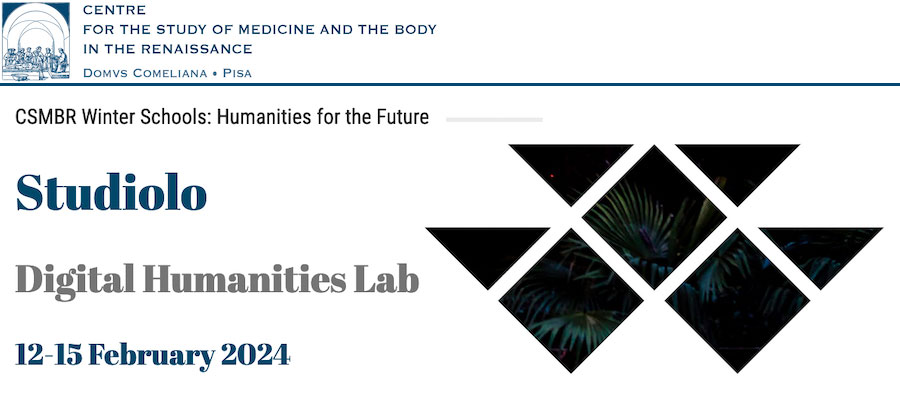Studiolo Digital Humanities Lab, Centre for the Study of Medicine and the Body in the Renaissance, Pisa, February 12–15, 2024
The advent of the digital age means that our past is now accessible through a medium that transcends time. While libraries, archives and museums are providing online access to the treasures of history that were once jealously guarded and are now at our fingertips, academia is facing a revolution both in the way scholars access knowledge, and also in the way they circulate, and disseminate it.
As knowledge defies physical boundaries and the Humanities go Digital, students, scholars, and academics are all invited to familiarise themselves with the new media in order to acquire the skills needed to keep up with the progress in their field.
The possibilities opened up by digital humanities are vast, and worth considering for anyone writing a new project, seeking funding or simply new means of implementing existing ideas.
Proficiency in Digital Humanities does not merely broaden one’s skillset; it fundamentally reshapes research, endowing it with greater depth and impact. Consider the capacity to unveil concealed patterns within historical datasets through sophisticated data analysis or the ability to reconstruct archaeological artifacts in three dimensions, yielding profound insights. These competencies not only elevate scholarly work but also facilitate the exploration of new avenues for funding and collaborative research.
Studiolo Digital Humanities Lab is a new Winter School format designed to meet the needs of those who, both inside and outside of academia, are faced with the digital revolution and want to make the most of it.
Its interdisciplinary format allows participants to get a feel for the potential of new media, while acquiring basic coding skills, knowledge of 3D modelling, Optical Character Recognition (OCR) and key concepts in Artificial Intelligence (AI) and Large Language Models (LLM), as well as tools for communicating with experts in the field.
The programme, spanning four days, will allow participants to interact with leading academics who have or are currently working as PI in important digital humanities projects in the history of art, medicine, science, philosophy, as well as philology and archaeology. It is designed to offer a comprehensive skillset at the end of which participants will be familiar with the main features of the field and will have the tools to shape their own projects.
Beyond frontal lectures, participants will have the opportunity to connect with a network of international scholars in a variety of fields, including both emerging and established figures.
Emphasising the acquisition of practical skills, the Winter School requires no prior knowledge of coding or other skills. It caters to individuals from different backgrounds and career stages. Participants will be provided training by means of frontal lectures, Q&As, workshops and a series of exercises in breakout sessions, including
- Basic coding skills in Python;
- An overview of the opportunities offered by data analysis;
- Database building;
- The potential of 3D Modelling in art and archaeology;
- An introduction to Machine Learning and Neural Networks;
- Insights into using AI to refine academic project writing;
- Knowledge of contemporary OCR systems, and training in how to use segmentation and text recognition;
- Analysis of case studies of some of the state-of-the-art projects in the field;
- Workshops focused on participants’ specific projects and needs.
The Winter School will be conducted online over four days, from 10.00am to 4.00pm (CET) daily. Each day will be divided into two sessions, the morning session (10am-1pm) and the afternoon session (2-4pm). The two sessions will alternately focus on developing coding skills and discussing current digital projects from a variety of disciplines. Group exercises in breakout sessions are also envisaged to implement the coding skills learned during the Winter School.
Fees
Early Bird Registration: € 180. Deadline: December 12, 2023
Regular Registration: € 250. Deadline: January 21, 2024
